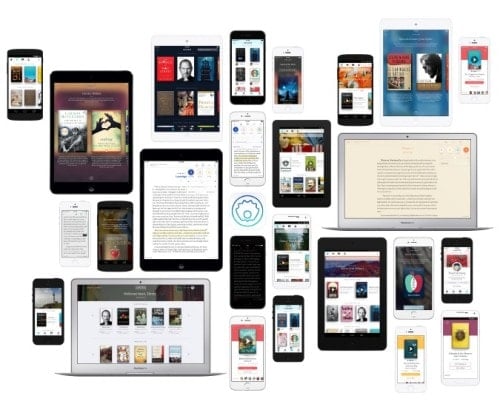The Digital Reader |
- The Morning Coffee – 5 November 2014
- That Sweet & Low eBook is Only the Tip of the Sponsored Content Iceberg
- Kindle Unlimited Launches in Spain, Italy
- Kindle Voyage Ships Today in the UK, Germany
- Disney Patents a Search Engine Which Makes it Harder to Find and Read Relevant Info
- Twelve24 Launches Kickstarter Project to Fund a $600 E-ink Wall Clock
- Oyster Goes Social, Lets Readers Create and Share Book Lists
- The Morning Coffee – 4 November 2014
| The Morning Coffee – 5 November 2014 Posted: 04 Nov 2014 08:07 PM PST The recipe for today’s coffee includes a hefty dollop of Mike Shatzkin, a dash of one software developer’s take on crafting an ebook, 110 writing tools for NaNoWriMo, and a sprinkling of public domain works at Harvard.
The post The Morning Coffee – 5 November 2014 appeared first on The Digital Reader. |
| That Sweet & Low eBook is Only the Tip of the Sponsored Content Iceberg Posted: 04 Nov 2014 04:24 PM PST
Oh, the horror:
The novel in question isn’t so much a novel as it is a multi-format work which includes an ebook as well as a series of websites and web TV shows, all of which is designed as “a vehicle for content sponsored by companies”. The artificial sweetener shows up several times in the story because its maker paid $1.3 million for the privilege, just like a car maker might pay to get their latest model added as a plot point in a tv series. Aside from the point that this idea is being applied to books, it’s not new. But I was inspired to comment on the story after Mike Cane posted his rant about it. I can’t quote much of what he wrote (it’s NSFW) beyond his description of the publisher was doing:
Needless to say, my viewpoint is much milder than his. Speaking as someone who has to make a living off of his writing, I have a passing knowledge of the history of sponsored content. It goes back decades, and while there are far more examples of sponsored content in books than I could fit in a single blog post there are a couple which stand out in my mind. Even if you leave out product placement in movies and tv shows and focus solely on books, this is far from the most obnoxious example of sponsored content. My nominee for that title would be Transformers and GIJoe – not the current movies but the original early 1980s comic books and tv series. I don’t know if the people who ranted about the recent terrible movies recall this, but the original comic books and tv series were created as a vessel to sell toys. This is especially true in the case of GI Joe, which was a doll long before the comic books and tv series. Marvel, which created and published the comic book series, got involved in GI Joe in the early 1908s when Hasbro wanted to restart the toyline, and was looking for a new way to promote it. And after GI Joe proved wildly successful, the two companies continued their partnership with the Transformers – which, like GI Joe, started as an idea for a line of toys and grew from there. And yet somehow, despite Marvel’s and Hasbro’s best efforts, those toys didn’t kill comic books as an art form. Something tells me that this Sweet & Low sponsorship won’t kill books, either.
The post That Sweet & Low eBook is Only the Tip of the Sponsored Content Iceberg appeared first on The Digital Reader. |
| Kindle Unlimited Launches in Spain, Italy Posted: 04 Nov 2014 11:54 AM PST
Amazon customers in Italy and Spain can now join customers in the US, UK, and Germany in enjoying a catalog of 700,000 titles. The service is now being offered for 10 euros a month, the same as it is in Germany. The retailer is promoting Kindle Unlimited along similar lines in both countries, touting the Kindle exclusive titles, English language titles, and classics as well as the 15,000 titles in Italian and the 25,000 titles in Spanish. In Spain, Amazon.es pitches Kindle Unlimited on the inclusion of writers like Santiago Posteguillo, Gabriel García Márquez, and KDP indie author Jorge Magano. In Italy, Amazon.it name drops Anna Premoli, Marcello Simoni and Stephenie Meyer. And in both countries, Amazon also mentions that readers can find Harry Potter, for Dummies books, and more. I have to say that I was surprised by today’s launch because I was expecting a more general launch, not a piecemeal launch in one country at a time. But now that I see the content deals Amazon has lined up I think I see a method to their madness. I don’t have any details on this aspect of the Italian ebook market, but I can tell you that Kindle Unlimited is launching in Spain with a larger catalog than any of its local competitors. Kindle Unlimited carries 25,000 Spanish language titles, far more than the 5,000 titles which Skoobe has in its catalog when it expanded into Spain last week, or the 16,000 titles found in the 24Symbols catalog. (I can’t tell you how many Spanish or Italian language titles Scribd has, however.) It looks like Amazon may have held the launch in Spain until they could guarantee a better selection than their competitors. On the other hand, they could have a minimum threshold for the number of local titles before Kindle Unlimited launches into another country . If that is correct then further expansion will likely be erratic. Update: Actualitte reported on the KU expansion earlier today and wrote that KU was facing stiff opposition from French publishers and distributors. This could explain why KU didn’t meet the rumored October launch date for France. The post Kindle Unlimited Launches in Spain, Italy appeared first on The Digital Reader. |
| Kindle Voyage Ships Today in the UK, Germany Posted: 04 Nov 2014 02:37 PM PST
Those prices are for the Wifi models; the 3G-equipped models will set you back an additional 60 euros or £80. The Kindle Voyage launched in the US in early September, and garnered positive but puzzled reviews when it shipped a couple weeks ago. It’s currently out of stock on Amazon.com, and is also out of stock at Best Buy (or so the website is telling me). Amazon expects to have the Kindle Voyage in stock at the beginning of next month. The Voyage ships with support for all of the local Kindle Stores, so I would not be surprised if the availability was expanded in the near future.
The post Kindle Voyage Ships Today in the UK, Germany appeared first on The Digital Reader. |
| Disney Patents a Search Engine Which Makes it Harder to Find and Read Relevant Info Posted: 04 Nov 2014 09:42 AM PST
Torrentfreak reported on Friday that Disney had been awarded a patent for a piracy-free search engine. While that is entirely true, the more interesting story was buried at the end of their post where it might have been missed. (I didn’t catch the significance until a reader pointed it out yesterday, and on reflection I think it deserves its own coverage.) The patent defines a custom search engine which assigns an “authenticity weight” to the sites listed in its index. Pirate sites and other undesirable websites of course have a lower authenticity weight than legitimate sites, and sites like Wikipedia and official sites owned by publishers and studios have a higher weight. While that sounds all well and good, Disney’s idea falls apart once you take a close look at what they think counts as an authentic or authoritative site. Here’s how the patent described it:
Do you see the problem? Disney has invented a search engine which is set up to tell you what their marketing dept wants you to see, not to show you links to relevant info. For example, when you’re searching for a movie you might want to find the trailer on Youtube, the summary on Wikipedia, and the reviews on Rotten Tomatoes. Those would all be useful and relevant, but rather than put those links at the top of the search results, Disney will instead show you the official website for the movie. Similarly, if you search for a book Disney will show you the publisher’s website ahead of the reviews on Goodreads and book blogs. ***IMO, what Disney is doing with this search engine is the equivalent of one of the classic logical fallacies: argument from authority. Disney is going to first show you what the authority wants to tell you, but not necessarily the results which you would be most interested in finding. In short, Disney has come up with a search engine no one, or at least no consumer, is going to want to use. Of course, that’s not the only way it could be used; Disney could also be planning to license the tech to another company (I don’t know who would want it but the idea is not impossible). The post Disney Patents a Search Engine Which Makes it Harder to Find and Read Relevant Info appeared first on The Digital Reader. |
| Twelve24 Launches Kickstarter Project to Fund a $600 E-ink Wall Clock Posted: 04 Nov 2014 07:48 AM PST
The ClockOne from Twelve24 is definitely in that latter category. Initially revealed at CES 2014 in January, the ClockOne is a one-of-a-kind wall clock which measures almost a meter wide but is only 5mm thin. It uses segmented E-ink displays to recreate on a large scale what an LED clock does on your nightstand: Thanks to its use of E-ink screen tech, the ClockOne is visible from almost every angle, offering a wider viewing angle that anything short of the best LCD and LED screens (unless you’re in the dark). And due to the low power requirements of E-ink screens, the ClockOne is powered by a single battery which is specced to run for up to a year. This saves owners from having to run an unsightly power cord, or replace the battery frequently. This clock was supposed to go up for pre-order in September, but it popped up on Kickstarter today. Twelve24 is seeking to raise $200,000 in order to mass-produce their clock. Backers who contribute $500 or more can pre-order a ClockOne in any of 5 colors (white blue, orange, pink, or moss), and early bird backers also have the option of ordering a white ClockOne for only $400. I haven’t ordered one myself (that $400 is more than I can afford to spend on a clock) but a lot of people are. The campaign started today and it’s already raised $20, 000 in a matter of hours. The post Twelve24 Launches Kickstarter Project to Fund a $600 E-ink Wall Clock appeared first on The Digital Reader. |
| Oyster Goes Social, Lets Readers Create and Share Book Lists Posted: 04 Nov 2014 06:35 AM PST
Like the thought (and sometime conflict) provoking bookshelf feature found on Goodreads and other book social networks, Book Lists enables readers to create and share curated lists of favorite titles freely and easily. And when a reader is browsing a list created by another, they can start reading any title in that list with the click of a button, or add it to their to be read pile. The list can also be saved so it can be browsed later. To mark the launch of this feature, Oyster a number of authors, publishers, and readers, including Michael Chabon and Doris Kearns Goodwin, Lincoln Michel of Electric Literature, and Alex Shephard of Melville House, to create lists. You can find those lists on the Oyster blog:
There’s really not much to say about Book Lists once I’ve pointed out the similarities to Goodreads, but I can add that the new Book Lists offers readers a 3rd way to discover their next book on Oyster, which already recommended new content through editorial curation by Oyster staff and through an algorithmic recommendation system. While this feature is not the first of its kind, it does mark a change in the subscription ebook market as one of the leading competitors expands from trying to have a larger catalog to also trying to out-Amazon Amazon in the book recommendation dept. While Amazon does own Goodreads, it’s not integrated into Kindle Unlimited to quite the same degree as Oyster’s new Book Lists. And while Scribd does have bookshelves, it looks from the outside like they are focused more on what a user has uploaded rather than a list which a user has assembled and shared. But I would not be surprised if that changes soon.
The post Oyster Goes Social, Lets Readers Create and Share Book Lists appeared first on The Digital Reader. |
| The Morning Coffee – 4 November 2014 Posted: 04 Nov 2014 06:40 AM PST The reading list is short this morning, but it includes a good mix of controversy and good news – looking forward to reading your comments.
The post The Morning Coffee – 4 November 2014 appeared first on The Digital Reader. |
| You are subscribed to email updates from The Digital Reader To stop receiving these emails, you may unsubscribe now. | Email delivery powered by Google |
| Google Inc., 1600 Amphitheatre Parkway, Mountain View, CA 94043, United States | |
![6962ded1603489f2f42f4ecf224c5b46[1]](http://the-digital-reader.com/wp-content/uploads/2014/11/6962ded1603489f2f42f4ecf224c5b461-112x150.jpg)


![disney-pirate[1]](http://the-digital-reader.com/wp-content/uploads/2014/11/disney-pirate1-150x121.jpg)
![ClockONE_04_gallery[1]](http://the-digital-reader.com/wp-content/uploads/2014/11/ClockONE_04_gallery1-250x138.jpg)



No comments:
Post a Comment